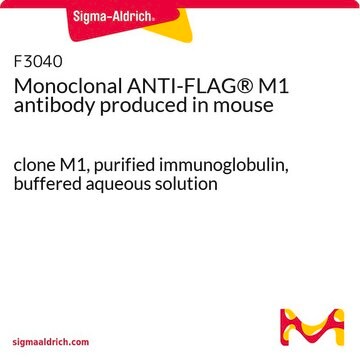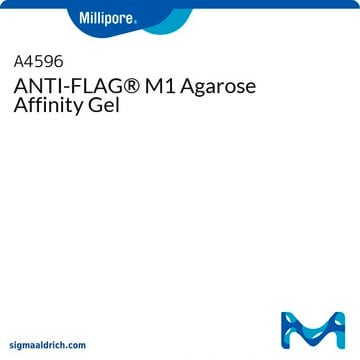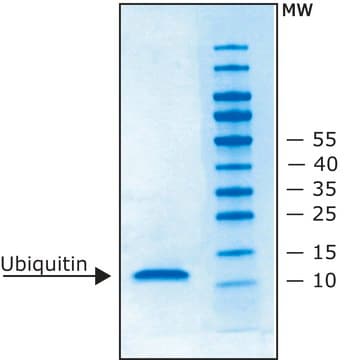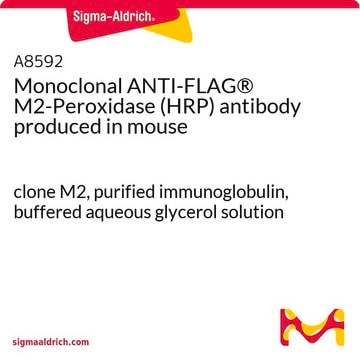추천 제품
생물학적 소스
mouse
결합
unconjugated
항체 형태
purified immunoglobulin
항체 생산 유형
primary antibodies
클론
M5, monoclonal
형태
buffered aqueous solution
정제법
using Protein A
종 반응성
all
농도
2-5 mg/mL
기술
western blot (chemiluminescent): 10 μg/mL
동형
IgG1
면역원 서열
DYKDDDDK
배송 상태
dry ice
저장 온도
−20°C
일반 설명
Monoclonal ANTI-FLAG® M5 is a mouse antibody that binds to N-terminal Met-FLAG fusion proteins. It is useful for detection of N-terminal Met-FLAG fusion proteins expressed in mammalian and Drosophilae cells.
Method of purification - Protein A
Method of purification - Protein A
면역원
FLAG; peptide sequence DYKDDDDK
애플리케이션
Monoclonal ANTI-FLAG® M5 antibody produced in mouse has been used in western blotting and immunofluorescence.
Binds the FLAG peptide only when it is located at the amino terminus preceded by a methionine. Binding is not Ca2+-dependent. Useful for detecting cytoplasmically expressed Met-FLAG fusion proteins in mammalian crude cell extracts, but not recommended for fusion proteins expressed in E. coli.
물리적 형태
Solution in 10 mM sodium phosphate, 150 mM NaCl, pH 7.4, containing 0.02% sodium azide (w/v)
제조 메모
Dilute the antibody to 10 mg/mL in Tris buffered saline (TBS): 0.05 M Tris, 0.15 M NaCl, pH 7.4.
기타 정보
Antibody is not calcium dependent.
법적 정보
ANTI-FLAG is a registered trademark of Merck KGaA, Darmstadt, Germany
FLAG is a registered trademark of Merck KGaA, Darmstadt, Germany
Not finding the right product?
Try our 제품 선택기 도구.
Storage Class Code
12 - Non Combustible Liquids
WGK
nwg
Flash Point (°F)
Not applicable
Flash Point (°C)
Not applicable
시험 성적서(COA)
제품의 로트/배치 번호를 입력하여 시험 성적서(COA)을 검색하십시오. 로트 및 배치 번호는 제품 라벨에 있는 ‘로트’ 또는 ‘배치’라는 용어 뒤에서 찾을 수 있습니다.
이미 열람한 고객
DEF-1/ASAP1 is a GTPase-activating protein (GAP) for ARF1 that enhances cell motility through a GAP-dependent mechanism
Furman C, et al.
The Journal of Biological Chemistry, 277(10), 7962-7969 (2002)
Chih-Chao Liang et al.
Nature communications, 7, 12124-12124 (2016-07-14)
The Fanconi anaemia (FA) pathway is important for the repair of DNA interstrand crosslinks (ICL). The FANCD2-FANCI complex is central to the pathway, and localizes to ICLs dependent on its monoubiquitination. It has remained elusive whether the complex is recruited
Franz Oswald et al.
Nucleic acids research, 44(10), 4703-4720 (2016-02-26)
The transcriptional shift from repression to activation of target genes is crucial for the fidelity of Notch responses through incompletely understood mechanisms that likely involve chromatin-based control. To activate silenced genes, repressive chromatin marks are removed and active marks must
CCAAT/enhancer-binding protein beta regulates the repression of type II collagen expression during the differentiation from proliferative to hypertrophic chondrocytes
Ushijima T, et al.
The Journal of Biological Chemistry, 289(5), 2852-2863 (2014)
Bader Almuzzaini et al.
FASEB journal : official publication of the Federation of American Societies for Experimental Biology, 30(8), 2860-2873 (2016-04-30)
Actin and nuclear myosin 1 (NM1) are regulators of transcription and chromatin organization. Using a genome-wide approach, we report here that β-actin binds intergenic and genic regions across the mammalian genome, associated with both protein-coding and rRNA genes. Within the
자사의 과학자팀은 생명 과학, 재료 과학, 화학 합성, 크로마토그래피, 분석 및 기타 많은 영역을 포함한 모든 과학 분야에 경험이 있습니다..
고객지원팀으로 연락바랍니다.













